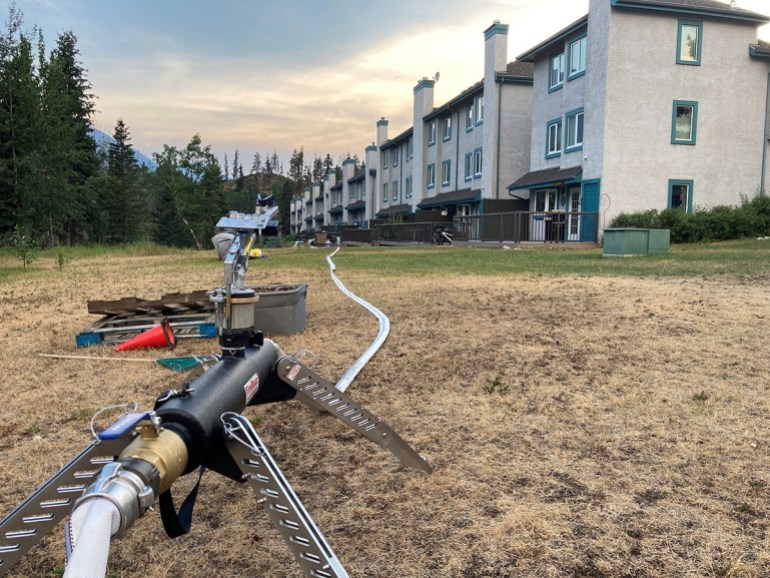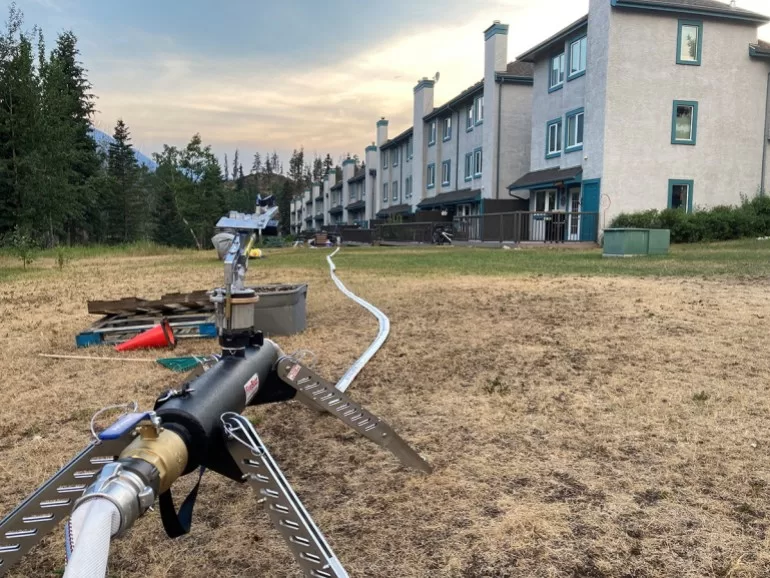A fast-moving wildfire has hit the town of Jasper in the Canadian Rockies, causing “significant” losses as firefighters work to hold back the flames.
In a statement in the early hours of Thursday, Jasper National Park said firefighting crews were trying “to save as many structures as possible and to protect critical infrastructure”.
Located about 370km (230 miles) west of Edmonton in the province of Alberta, the park and the town of Jasper, home to 4,700 residents, draw more than two million tourists annually.
Thousands of people were evacuated from the area earlier this week as two blazes edged closer.
“As the pictures and videos circulating online show, significant loss has occurred within the townsite,” Jasper National Park said in a post on X.
In another update on Thursday morning, the park said while the area received a “small amount of rain overnight” that helped slightly reduce fire activity, “it is not enough to have made a meaningful impact to the overall wildfire situation, which remains out of control”.
“Due to the ongoing fire conditions and our focus on the response effort, it is impossible to share information about specific locations and the extent of damage at this time,” it said.

Alberta Premier Danielle Smith told reporters that authorities were seeing “potentially 30 percent to 50 percent structural damage” in Jasper, which would incur a “significant rebuild”.
The blaze is one of hundreds ravaging Alberta and the neighbouring province of British Columbia, fuelled by a weeks-long heatwave and surge in lightning strikes.
Officials said the flames in Jasper reached a height of 122 metres (400 feet) and moved at 15 metres (50 feet) a minute.
Canadian Prime Minister Justin Trudeau said early on Thursday that his government had approved Alberta’s request for federal assistance.
“We’re deploying [Canadian Armed Forces] resources, evacuations support, and more emergency wildfire resources to the province immediately — and we’re coordinating firefighting and airlift assistance. Alberta, we’re with you,” Trudeau wrote on X.
Trudeau added later in the day that more than 400 firefighters from Australia, New Zealand, Mexico and South Africa were on their way to help fight the blazes in the province.
Experts say the climate crisis has extended the Canadian wildfire season, which typically runs from late April until September or October, and increased lightning – a major cause of the blazes.
Mike Flannigan, research chair for predictive services, emergency management and fire science at Thompson Rivers University in British Columbia, told Al Jazeera last year that a warmer atmosphere also dries out fire fuels, such as the vegetation on forest floors.
We’ve approved Alberta’s request for federal assistance. We’re deploying @CanadianForces resources, evacuations support, and more emergency wildfire resources to the province immediately — and we’re coordinating firefighting and airlift assistance. Alberta, we’re with you.
— Justin Trudeau (@JustinTrudeau) July 25, 2024
Canada saw its most intense fire season on record in 2023, with more than 6,600 wildfires burning 15 million hectares (37 million acres) across the country, an area roughly seven times the annual average.
On Wednesday evening, Jasper’s Mayor Richard Ireland told the Canadian public broadcaster CBC News that multiple structures were burning in the community and “it appears that the damage will be extensive”.
“This is simply, absolutely, our community’s worst nightmare,” Ireland said. “Residents watching from afar, [it’s] far beyond nervousness. I think like all residents, I feel devastated, shattered, and absolutely helpless in the face of nature, which is just so powerful.”
One of the buildings destroyed by the fire was the Maligne Lodge hotel in the south of the town.
“It’s just so sad to know that so many families and people have lost not just their belongings but their livelihood and a beautiful park,” owner Karyne Decore told CBC.
There are 175 wildfires currently burning in Alberta, according to a provincial tracker, and more than 50 of them are out of control.
